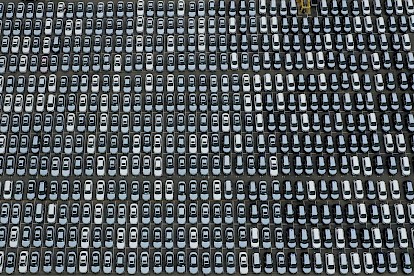World’s biggest carmakers to build 400m more vehicles than 1.5C climate target will allow
 The world’s biggest carmakers plan to build about 400m more diesel and petrol cars than what is sustainable to contain global heating, a study has found.
The world’s biggest carmakers plan to build about 400m more diesel and petrol cars than what is sustainable to contain global heating, a study has found.
Researchers from the University of Technology Sydney (UTS), the University of Applied Sciences of the Industry in Bergisch Gladbach and Greenpeace Germany compared the rate at which the world needed to embrace zero-emissions vehicles with the rate at which major car companies were planning to produce various models.
The report, which focused on 12 carmakers globally, showed some of Australia’s most popular brands – Toyota, Volkswagen and Hyundai/Kia – were on track to make far more petrol and diesel cars than is sustainable if the world is to limit global heating to the Paris climate agreement target of 1.5C.
Researchers calculated the global carbon budget – how much carbon the world can still emit and remain within a 1.5C envelope – using a climate model developed by UTS and came up with a figure of 53Gt.
“The carbon budget of 53Gt allows for the sale of an additional 315 million ICE [internal combustion engine] vehicles as of 2022,” the report states.
“At the same time, however, projected ICE sales range between at least 645m and 778m vehicles. This represents an overshoot of 105% to 147% compared to the 1.5°C-compatible number of ICE sales.”
Around the world carmakers are shifting towards electric vehicles, with companies such as Volvo, General Motors and Mercedes-Benz planning to stop manufacturing petrol engines, some as soon as 2025.
But Toyota was expected to produce 63m more petrol and diesel cars than was sustainable, followed by Volkswagen with 43m and Hyundai with 39m, the report found.
Sven Teske, an associate professor at UTS and co-author of the report, said the research showed there was a need for a global ban on new petrol vehicles beyond 2030.
“By 2030 at the very latest, all new vehicles sold on the market must be electric,” Teske said.
Dr Robin Smit, a director at Transport Energy/Emission Research who was not involved in the report, said Australia had become a market for heavy, thirsty SUVs.
“The sustained and increasing proportion of large and heavy passenger vehicles in on-road fleets around the world and particularly in Australia has a detrimental effect on energy efficiency and global greenhouse gas emissions,” Smit said.
The worst performer was Australia’s most popular carmaker, Toyota.
Lindsay Soutar, a senior campaigner at Greenpeace, said the company had lagged in embracing zero-emissions vehicles and its global lobbying efforts had stalled policies to encourage change.
“What the report shows and what we found is that Toyota is the worst performer of the lot,” she said. “The report shows they are the least on track of all the big four in Australia.”
Satour said other companies like Volkswagen had campaigned for better policy in Australia “which is positive”, though it still needed to do more.
A Toyota Australia spokesperson said in a statement the company was the “largest supplier of hybrid vehicles in Australia with more than 300,000 sold since 2001”.
“Toyota is not limited to a single technical solution,” the spokesperson said. “We remain absolutely committed to providing our customers with a diverse range of vehicles and technologies, including [battery electric vehicles], that will help them on their journey to zero tailpipe emissions based on their individual motoring circumstances, ensuring no one is left behind.”
The spokesperson said Toyota Australia “would welcome” the introduction of a mandatory new-vehicle CO2 emissions standard that “works to support the achievement of the Paris agreement goals”.
Speaking about Australia specifically, a spokesperson for Volkswagen Group Australia said the company planned to bring several new battery electric vehicle models to Australia.
“While Volkswagen Group Australia has this year secured production approval for a range of electric vehicles and plug-in hybrids, these are sourced from Europe, where demand overwhelms supply,” the spokesperson said.
“Although progress is at last being made, Australia remains a considerable distance behind other developed countries in creating the conditions for EVs. The mandating of an emissions target for auto importers will ensure a greater supply of affordable EVs and enable mass market importers to meet demand.”
Hyundai Australia was contacted for comment.
Behyad Jafari, from the Electric Vehicle Council, said demand for zero-carbon vehicles was “absolutely there” but customers were being forced to buy petrol cars due to a lack of supply.
“The reality is every EV coming here has been sold and been sold out six months before it lands,” Jafari said. “Car companies will point to all their petrol vehicles as an indicator of customer demand but they’re not telling you people are walking into their dealerships and asking for electric vehicles every day.”
Jafari said that since Australia had delayed in converting its car fleet to electric, and because the average life of a vehicle is nearly 20 years, the government has to act quickly to meet its international emissions obligations.
“The question is how much of a burden are we placing on every other sector?” he said. “How much are farmers, industry and other sectors going to have to cut their emissions more to make up for the fact that some car companies want to make more money now?”
You can return to the main Market News page, or press the Back button on your browser.

